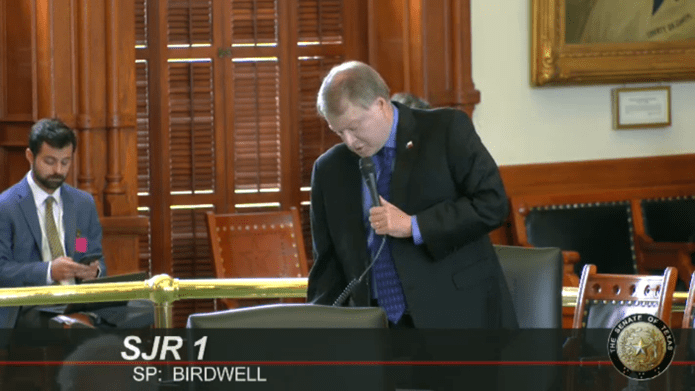On Wednesday, the Texas Senate gave preliminary approval to Senate Joint Resolution 1, a proposed constitutional amendment that, if adopted by Texans, would change the current requirements for a legislative quorum in both chambers from that of two-thirds to a simple majority of lawmakers. It passed to engrossment by a vote of 19-10.
Notably, there was one Republican who voted against the bill: State Sen. Robert Nichols (R–Jacksonville).
He joined Democrat State Sens. Carol Alvarado (Houston), Cesar Blanco (El Paso), Sarah Eckhardt (Austin), Roland Gutierrez (San Antonio), Nathan Johnson (Dallas), Beverly Powell (Burleson), Royce West (DeSoto), John Whitmire (Houston), and Judith Zaffirini (Laredo).
But the proposition must be considered one more time by the Senate before being sent to the House of Representatives. That’s where math begins to become a potential problem.
Is the Math There for Final Passage?
For a constitutional amendment to pass the Senate, the bill would need the support of two-thirds of those present. If all 31 members were present, that would mean a total of 21 votes.
When the bill was considered in the Senate Special Committee on Constitutional Issues on Monday, it passed with bipartisan support as Democrat State Sens. Chuy Hinojosa (McAllen) and Eddie Lucio (San Benito) joined Republicans in voting it out of committee unanimously.
They both voted in favor of the bill on Wednesday.
Absent were Democrat State Sens. Jose Menendez (San Antonio) and Borris Miles (Houston), who are largely presumed to oppose the legislation.
Ultimately, this means that even if Nichols is convinced to vote in favor of the bill on its final consideration, it still lacks one vote for final passage. This leads many Texans to wonder which Democrat state senator will be the one to potentially change their position on something currently enabling their absent Democrat House colleagues to paralyze the Texas House of Representatives.
Alternatively, the bill could be considered on final reading when one or more Democrat members are absent.
What Does it All Mean?
Texas is one of only four states that requires a supermajority of legislators present to conduct legislative business. The author of the proposed constitutional amendment, State Sen. Brian Birdwell (R–Granbury), argues that adopting a new quorum standard will prevent a minority of lawmakers from wielding disproportionate power so as to render the Texas Legislature incapable of responding to the will of the majority of Texans.
In mid-July, during the first called special session, Lt. Gov. Dan Patrick submitted a letter to Gov. Greg Abbott to add changing the quorum requirement to the call of the ongoing special session.
“Texans expect their legislature to work and not be held hostage by a few legislators who are exploiting the quorum requirement. The majority of other state legislatures require a simple majority plus one.” Patrick said. “The Texas Legislature should be able to move forward and serve the people of Texas when a majority of its members are present.”
Even if the proposed constitutional amendment were to pass the Senate, its legislative prospects in the House remain unclear. The lower chamber remains under that vote threshold, lacking a quorum; even then, it is unclear whether the lawmakers present would support such a change even if they could conduct business.





